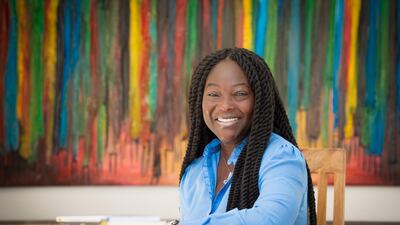A Dubai-based executive at the International Chamber of Commerce has made realising the “untapped potential” of trade between the UAE and Africa the top priority of her new role.
Valentina Mintah, who late last month became the first black female board member in the chamber of commerce's 100-year history, told The National that the foundation of the trading relationship between the UAE and its partners in Africa was the similarities shared by both sides.
Both parties have “very similar cultures and very similar histories”, said Ms Mintah, 47, who spoke via Zoom after returning to Dubai on one of the first available flights from Britain.
Most importantly both the UAE and Africa have a “very young, vibrant, dynamic and well-educated populace,” she said.
A keen eye for the details of local business as well as being able to step back and work from a global perspective were also common traits she identified on both sides of the relationship. “Those similarities, that’s the foundation,” she said.
The Ghanaian-British tech executive, who has worked in international trade and development across Africa and Asia, said Africa would be able to “draw a lot of lessons from the UAE”, and added that there is “huge potential, which is yet untapped”.
But boosting ties would be to the benefit both parties: “With the right relationships we can maximise those potentials very quickly and draw lessons from each other.”
“For me, it’s very important that it’s a symbiotic relationship.”

The chamber of commerce executive hailed the UAE’s services culture and manufacturing capacity as two of the characteristics that made it an effective trading partner.
Some industries in Africa, she said, “haven’t hit the maturity level that is expected”, but the UAE has the know-how and the skill sets to help and ensure both parties can get the most out of their international trade relationships. “[The UAE] has the machinery to be able to achieve, and then the services on top of that, to make sure we can realise value.”
Ms Mintah highlighted technology, infrastructure and manufacturing as areas that were likely to drive a growth in trade between the UAE and Africa. Improving supply chains would enable greater trade to the benefit of both sides, she said, and added there remained obstacles to ensuring technological development could proceed unhindered.
“One thing about technology is that in order to realise maximum benefit you have to make sure that all the preconditions are met,” she said. “We need to make sure that the road networks, the rail networks, the transportation networks are solidly in place and robust enough.”
The UAE’s relationship with its trading partners in Africa has already grown much closer. A new, younger generation has taken up the challenge of boosting trade on both sides of the negotiating table, and is working “as peers” to change the nature of the relationship fundamentally.
“Historically, wrongly or rightly, you’d have raw materials going straight out, where it’s just a transaction and a product and an exchange, which sometimes is not a win-win situation for everyone” she said.
“Now, with a new generation coming in and with a new mind set, this time we’re sitting around the table trying to find out ‘what’s in it for me?’ from both sides of the table and ensure that the relationship is of benefit to both sides.
“Being able to sit at the table and see what is best for both regions is what I am driving at,” she said.
The chamber executive said she was excited to get working to realise the “huge potential” in the relationship, and added that innovative thinking and coming up with new ways of solving problems was one of the defining characteristics of the Emirates.
The UAE, she said, excelled at “thinking outside of the box and coming up with a simple but yet very effective solution”.
Pointing to the UAE’s handling of the coronavirus pandemic, Ms Mintah praised the way the country has used technology to help spread information about the virus, lauding the use of smart technology in particular as “very exciting”.
The UAE, she said, “stands out miles apart” in terms of its ability to find new ways of tackling problems. “It’s totally different from what, traditionally, we are used to.”


